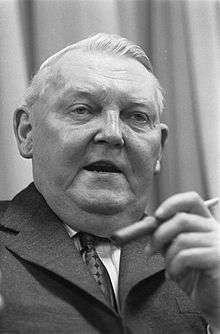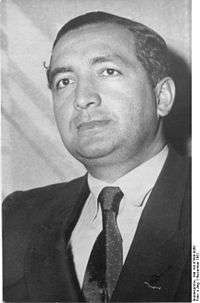West German federal election, 1965
| | |||||||||||||||||||||||||||||||||||||||||||||||||||||||
| |||||||||||||||||||||||||||||||||||||||||||||||||||||||
| |||||||||||||||||||||||||||||||||||||||||||||||||||||||
|
| |||||||||||||||||||||||||||||||||||||||||||||||||||||||
| Party list election results by state: the lighter blue denotes states where CDU had the plurality of votes; darker blue denotes states where CSU had the absolute majority of the votes; and pink denotes states where the SPD had the plurality of votes | |||||||||||||||||||||||||||||||||||||||||||||||||||||||
| |||||||||||||||||||||||||||||||||||||||||||||||||||||||

 |
| This article is part of a series on the politics and government of Germany |
|
Constitution ("Fundamental Law Code") |
|
| Foreign relations |
Federal elections were held in West Germany on 19 September 1965. The CDU/CSU remained the largest faction, while the Social Democratic Party remained the largest single party in the Bundestag, winning 251 of the 518 seats (including 15 of the 22 non-voting delegates for West Berlin).
Campaign
Federal Chancellor Ludwig Erhard was initially popular as the acclaimed "father" of West Germany's economic miracle of the 1950s and early 1960s. West Germany's economy still seemed solid in 1965, and thus not enough West German voters wanted to change the party of Federal Chancellor. To ensure his victory in this Bundestag election, Erhard promised to cut income tax and to increase social program spending.[3][4]
Results
| Parties | Constituency | Party list | Total seats | |||||||||||||
|---|---|---|---|---|---|---|---|---|---|---|---|---|---|---|---|---|
| Votes | % | +/− | Seats | +/− | Votes | % | +/− | Seats | +/− | Seats† | +/− | % | ||||
| Social Democratic Party (SPD) | 12,998,474 | 40.1 | +3.6 | 94 | +3 | 12,813,186 | 39.3 | +3.1 | 108 | +9 | 217 | +14 | 41.9 | |||
| Christian Democratic Union (CDU) | 12,631,319 | 38.9 | +2.6 | 118 | +4 | 12,387,562 | 38.0 | +2.2 | 78 | ±0 | 202 | +1 | 39.0 | |||
| Christian Social Union (CSU) | 3,204,648 | 9.9 | +0.2 | 36 | −6 | 3,136,506 | 9.6 | ±0 | 13 | +5 | 49 | −1 | 9.5 | |||
| Free Democratic Party (FDP) | 2,562,294 | 7.9 | −4.2 | 0 | ±0 | 3,096,739 | 9.5 | −3.3 | 49 | −18 | 50 | −17 | 9.7 | |||
| National Democratic Party (NPD) | 587,216 | 1.8 | +1.8 | 0 | ±0 | 664,193 | 2.0 | +2.0 | 0 | ±0 | 0 | ±0 | 0 | |||
| German Peace Union (DFU) | 386,900 | 1.2 | −0.6 | 0 | ±0 | 434,182 | 1.3 | −0.6 | 0 | ±0 | 0 | ±0 | 0 | |||
| Action Community of Independent Germans (AUD) | 46,146 | 0.1 | +0.1 | 0 | ±0 | 52,637 | 0.2 | +0.2 | 0 | ±0 | 0 | ±0 | 0 | |||
| Christian People's Party (CVP) | 11,978 | 0.0 | +0.0 | 0 | ±0 | 19,832 | 0.1 | +0.1 | 0 | ±0 | 0 | ±0 | 0 | |||
| Free Social Union (FSU) | 6,287 | 0.0 | +0.0 | 0 | ±0 | 10,631 | 0.0 | +0.0 | 0 | ±0 | 0 | ±0 | 0 | |||
| Independent Workers' Party (UAP) | 1,127 | 0.0 | +0.0 | 0 | ±0 | 3,959 | 0.0 | +0.0 | 0 | ±0 | 0 | ±0 | 0 | |||
| European Federalist Party (EFP) | – | – | – | – | – | 1,015 | 0.0 | +0.0 | 0 | ±0 | 0 | ±0 | 0 | |||
| Electoral groups and independents | 660 | 0.0 | ±0 | 0 | ±0 | – | – | – | – | – | 0 | ±0 | 0 | |||
| Invalid/blank votes | 979,158 | — | — | — | — | 795,765 | — | — | — | — | — | — | — | |||
| Totals | 33,416,207 | 100 | ±0.0 | 248 | +1 | 33,416,207 | 100 | ±0.0 | 248 | -4 | 518 | -3 | ±0 | |||
| Registered voters/turnout | 38,510,395 | 86.8 | — | — | — | 38,510,395 | 86.8 | — | — | — | — | — | — | |||
| Source: Federal Returning Officer | ||||||||||||||||
- ^† — includes the non-voting delegates for West Berlin (15 SPD, 6 CDU, 1 FDP).
| 251 | 50 | 217 |
| CDU/CSU | FDP | SPD |
Aftermath
The coalition between the CDU/CSU and the FDP returned to government, with Ludwig Erhard as Chancellor. In 1966, the FDP left the coalition over budget issues, and Erhard resigned. Kurt Georg Kiesinger (also CDU) formed a new grand coalition between the CDU/CSU and the SPD which lasted until the next election.
References
- 1 2 "Wahl zum 5. Deutschen Bundestag am 19. September 1965" (in German). Bundeswahlleiter. Retrieved 2012-05-06.
- ↑ "Voter turnout by election year". Website of the Federal Returning Officer's Office. The Federal Returning Officer. Retrieved 7 November 2014.
- ↑ Bjöl, Erling. "Erhard's Victory and Fall". Grimberg's History of the Nations, volume 23: The Rich West. p. 339.
- ↑ Bark, Dennis L.; Gress, David R. (1989). A History of West Germany, volume 2: Democracy and Its Discontents, 1963–1988. London, UK: Basil Blackwell.



